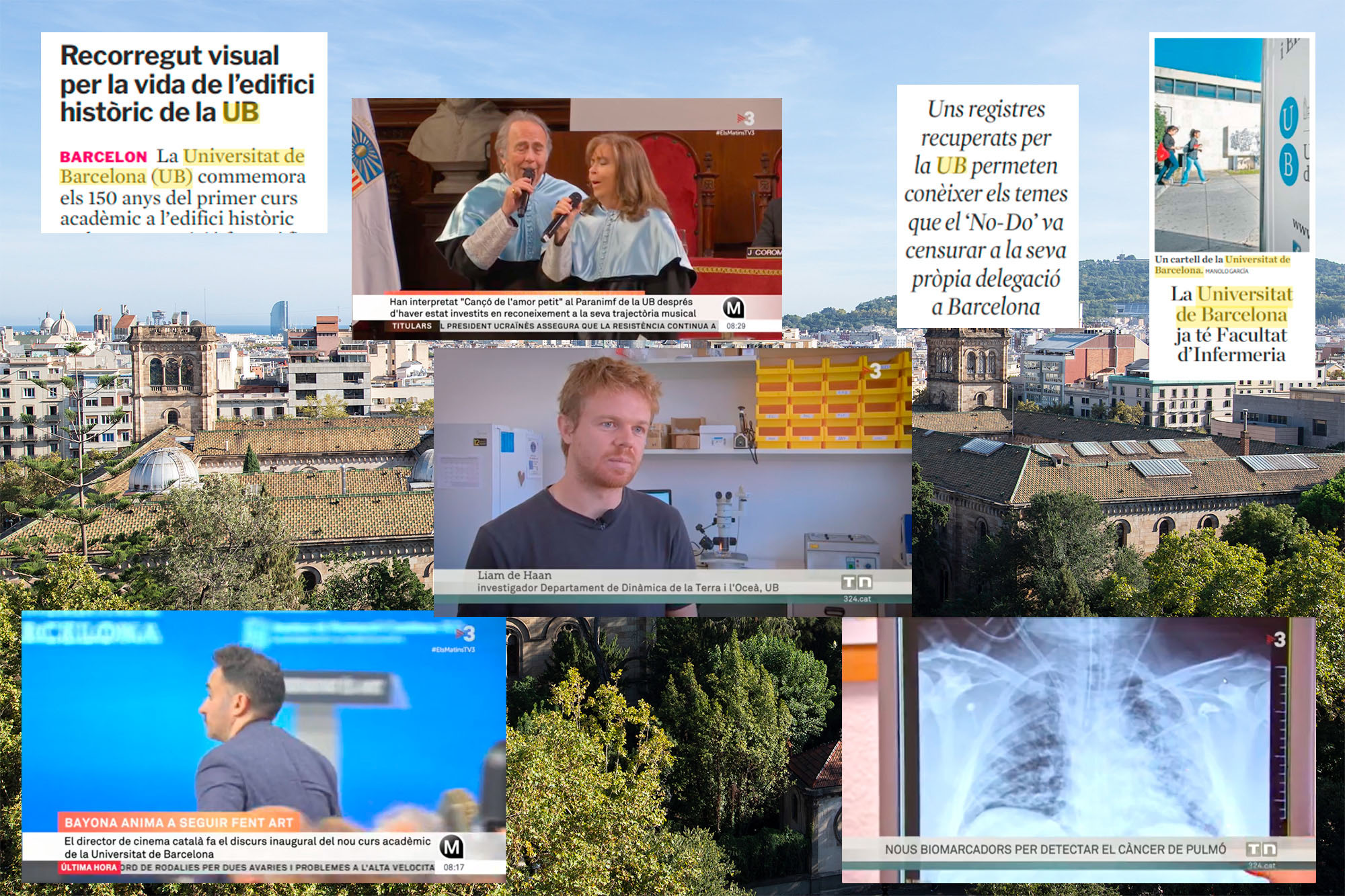A year in front-pages


In February, as part of the 150th anniversary of the Historic Building, the University of Barcelona organized an exhibition of old photographs of the most emblematic spaces of the UB’s headquarters and some remarkable situations that took place there. In an article titled “La Universitat de Barcelona desempolsega 150 anys de la seva història en fotos”, journalist Carles Cols, from El Periódico, states: “We could write a column for each photo. Like this one that shows a smiling Victoria de los Ángeles with her father, Bernardo López Gámez, who, since he was the janitor of the building, lived in this part of the University”.
On 6 March, 2023, the Paranymph Hall of the Historic Building held one of the cultural episodes of the year: the honorary doctorate award ceremony for the singer-songwriters Joan Manuel Serrat and Maria del Mar Bonet. The ceremony had a great reception by the media in Spain. Gonzalo Moncloa, journalist in El País, wrote that both artists were given this award “defending a renewed fight for freedom”.
The creation of the new UB’s Faculty of Nursing was one of the highlights of the year for the institution. The new centre was created with the aim of "making a decisive contribution to the visibility and social recognition of the nursing profession in Catalonia, the rest of Spain and the world". The rector of the UB, Joan Guàrdia, explained to Els Matins de TV3 what this step meant for the UB: "It will become one of the great faculties of our country and will involve an advantage in access to resources, budgets, ability to access active university policies and, above all, the presence of nurses with all the studies in the analysis of university policy. It was already a very active sector, but they are given the definitive status to be able to sit on equal terms".
The UB's research in the media
Once more, the media explained the excellence of the research carried out by researchers at the University of Barcelona. On El Món a Rac 1, Jordi Basté reported on the pioneering technique developed by the UB and IBEC to fight lung cancer. Meanwhile, researchers from the UB's Ars Picta research group, Milagros Guardia and Juan Antonio Olañeta, identified six panels from churches in the Catalan Pyrenees in a private collection in Switzerland. Silvia Marimon, from Diari Ara, spoke to Olañeta about the findings. "There were fragments that were torn off directly so that they could be framed and sold as paintings", said the researcher.
Indeed, the UB’s leadership in research is one of the key factors that explains the institution's good position in the rankings, such as the CWUR, which ranked the UB among the 150 best universities in the world. Diana Silva, also from Diari Ara, wrote in the pages of the newspaper: "The CWUR ranking, which is one of the five most prestigious in the world, has classified 20,531 universities according to various objective criteria such as the quality of teaching and training of students, the position of the university in the ranking of each country, or the research published and its citations".
Like every September, the University of Barcelona opened the academic year with a special guest, the filmmaker Juan Antonio Bayona, trained at ESCAC, a UB-affiliated centre. Ana Pantaleoni, from El País, explains in her chronicle: "The lesson begins. Bayona takes the floor from the pulpit. ‘I believe I can fly, I believe I can lift a car’. He repeats it several times. Bayona's first memory is of a film shot, specifically of Superman flying across the screen. And since then, he hasn't stopped. Bayona tells the students that making a film means testing yourself, leaving your comfort zone: "There is no artificial intelligence that can replicate our soul". He assures that intuition the key, "a spark, a passion, and without it you will never reach the end successfully".
Media interest in the activities carried out by the UB has remained constant throughout the year and has reached December, when the institution conferred an Honorary Doctorate on the chef from Sant Pol de Mar, Carme Ruscalleda. Gerard Guerrero, from La Vanguardia, defined the chef as "a self-taught cook, a perfectionist, a worker of innovative and creative cuisine, who constantly reinterprets traditional recipes and is committed to sustainability".
